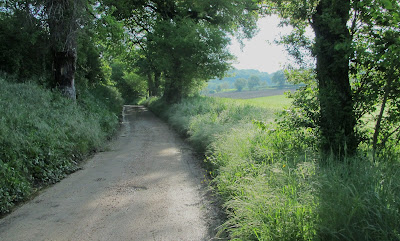 |
| View up Bailgate with the market in full swing. |
Lincoln hosts one of the largest Christmas markets in
Europe, attracting at least 150,000 visitors over 4 days, arriving by coach and
car from all over the Midlands and North as well as on luxury packages by
chartered steam trains from London.
I remember the first Lincoln Christmas
Market in 1982,with a Christmas tree that was delivered in true twin-town spirit, on top of a fire
engine by the Fire Brigade of Neustadt-an-der-Weinstrasse, Lincoln's twin
town in Germany. In 1982 it was a homely affair with just 11 stalls, but this year,30 years on,
there were nearly 300 stalls and, by all accounts, it was organised chaos.
Sheer pressure of numbers resulted in the implementation of
total pedestrianisation in the central area of Uphill Lincoln, combined with a one-way system. Theoretically, I could
only turn left from my front door and would then have to walk more than a mile
to follow the one-way system to get back home. Fortunately, family commitments
in Hampshire took me out of town for the weekend, so I avoided the horror of
British mass tourism.
The majority of reviews on TripAdvisor rate the event as
either "Poor" or "Terrible," with the following comment
putting it bluntly:-
"It was an awful event and the organisers need to be much more truthful about it - in no way does it resemble any Christmas market that I've ever been to and the fact that huge numbers of people flock there every year does not make it good. It was cheap, tatty and nasty, very crowded and not in the slightest bit Christmassy."But, as the saying goes: ...it's an ill wind...and at least the Cathedral prospered from the increase in visitors, with trade in the gift shop and coffee shop bringing in £34,000 and visitor donations totalling more than £25,000
For many people, Christmas is a consumerist bonanza. Children are encouraged to think about presents, while adults are encouraged to think about parties and over-indulging. Fortunately there are other aspects, even to the secular Christmas. Perhaps all the excesses lead people to stop and think of others and thus create a peak in charitable donations.
Certainly, Christmas is a time to stop and think, with the result that this is the start of the busy season for marriage guidance, and relationship counsellors. This is when people are forced to spend time together and all the buried anger and dissatisfaction rises to the surface and reveals the break-downs. Decisions have to be taken, and not all New Year resolutions bring happiness.
I think that in the end, we all put out own meaning on Christmas, in addition to any religious beliefs we might individually attribute to the traditional festival. For me, it's about that point between yesterday and tomorrow when we can stop and reflect and the past year, think about where we are today and look forward to where we will be in the year ahead. My 2012 was a huge terminal upheaval, just as the Mayans predicted. I am in awe of the future prospect and am determined to live it to the full.
Linus van Pelt explained his thoughts to his close friend Charlie Brown, and I agree that "finding the inner child" is a very important aspect of the season. I want to reject all the negativity that adulthood brings us, and remind myself that anything and everything is possible. Happy New Year, everyone.
 |
| with acknowledgements to Peanuts by Schultz |


































